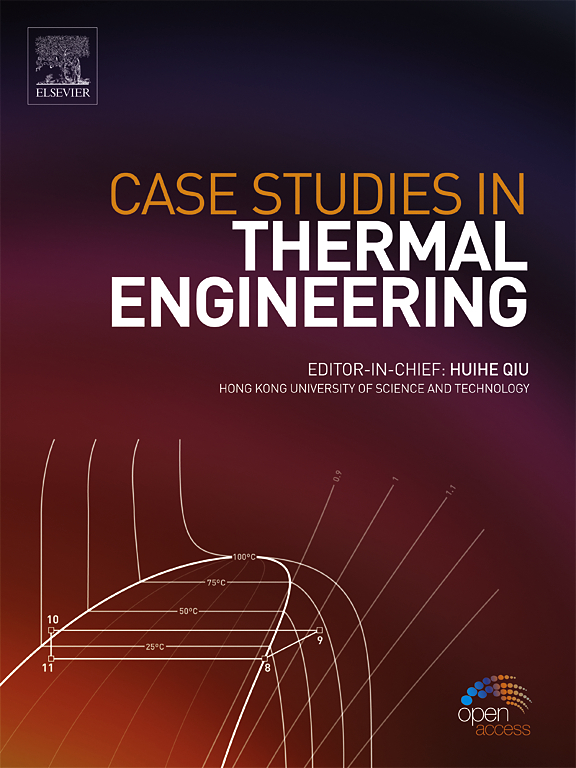Maximizing the energy efficiency of induced draft and hybrid draft cooling towers
IF 6.4
2区 工程技术
Q1 THERMODYNAMICS
引用次数: 0
Abstract
Cooling towers consume energy in the order of several hundred kilowatts for operating fans and pumps for driving air and water through the tower. Therefore, it is financially advantageous and environmentally friendly to optimize the fan operation of a cooling tower. The current study optimizes the fan operation using data obtained from full-scale induced-draft and hybrid-draft cooling towers. The optimization was performed on a previously developed model, with a prediction accuracy exceeding 0.9 R2, while keeping the outlet temperature of the cooling tower within the specifications of the plant. The fan operation was optimized such that the energy efficiency (ratio of heat released from the water to the energy consumed by the cooling tower) is maximized. This study demonstrates how over 50 % of energy savings can be realized by optimizing the fan operation of induced draft cooling towers. The energy efficiency of hybrid draft cooling towers can be maximized while improving the cooling capacity of cooling water. In this study, differences in the balance between energy efficiency and cooling capacity were observed in the hybrid-draft and induced-draft cooling towers.
最大限度地提高诱导通风和混合通风冷却塔的能源效率
冷却塔要消耗几百千瓦的能量,用于运行风扇和泵,以驱动空气和水通过冷却塔。因此,对冷却塔的风机运行进行优化,既经济上有利,又环保。目前的研究使用从全尺寸诱导通风和混合通风冷却塔获得的数据来优化风扇操作。优化是在先前开发的模型上进行的,预测精度超过0.9 R2,同时保持冷却塔出口温度在工厂的规格范围内。风扇运行经过优化,使能源效率(从水释放的热量与冷却塔消耗的能量的比率)最大化。该研究表明,通过优化引风冷却塔的风扇运行,可以实现50%以上的节能。在提高冷却水冷却能力的同时,可以最大限度地提高混合通风冷却塔的能源效率。在本研究中,观察了混合通风和诱导通风冷却塔在能源效率和制冷量之间的平衡差异。
本文章由计算机程序翻译,如有差异,请以英文原文为准。
求助全文
约1分钟内获得全文
求助全文
来源期刊

Case Studies in Thermal Engineering
Chemical Engineering-Fluid Flow and Transfer Processes
CiteScore
8.60
自引率
11.80%
发文量
812
审稿时长
76 days
期刊介绍:
Case Studies in Thermal Engineering provides a forum for the rapid publication of short, structured Case Studies in Thermal Engineering and related Short Communications. It provides an essential compendium of case studies for researchers and practitioners in the field of thermal engineering and others who are interested in aspects of thermal engineering cases that could affect other engineering processes. The journal not only publishes new and novel case studies, but also provides a forum for the publication of high quality descriptions of classic thermal engineering problems. The scope of the journal includes case studies of thermal engineering problems in components, devices and systems using existing experimental and numerical techniques in the areas of mechanical, aerospace, chemical, medical, thermal management for electronics, heat exchangers, regeneration, solar thermal energy, thermal storage, building energy conservation, and power generation. Case studies of thermal problems in other areas will also be considered.
 求助内容:
求助内容: 应助结果提醒方式:
应助结果提醒方式:


